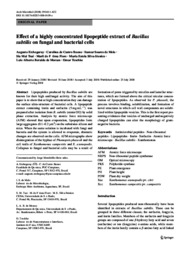Effect of a highly concentrated lipopeptide extract of Bacillus subtilis on fungal and bacterial cells.
Effect of a highly concentrated lipopeptide extract of Bacillus subtilis on fungal and bacterial cells.
Author(s): ETCHEGARAY, A.; BUENO, C. de C.; MELO, I. S. de; TSAI, S. M.; FIORE, M. F.; SILVA-STENICO, M. E.; MORAES, L. A. B. de; TESCHKE, O.
Summary: Lipopeptides produced by Bacillus subtilis are known for their high antifungal activity. The aim of this paper is to show that at high concentration they can damage the surface ultra-structure of bacterial cells. A lipopeptide extract containing iturin and surfactin (5 mg mL¡1) was prepared after isolation from B. subtilis (strain OG) by solid phase extraction. Analysis by atomic force microscope (AFM) showed that upon evaporation, lipopeptides form large aggregates (0.1?0.2 m2) on the substrates silicon and mica. When the same solution is incubated with fungi and bacteria and the system is allowed to evaporate, dramatic changes are observed on the cells. AFM micrographs show disintegration of the hyphae of Phomopsis phaseoli and the cell walls of Xanthomonas campestris and X. axonopodis. Collapses to fungal and bacterial cells may be a result of formation of pores triggered by micelles and lamellar structures, which are formed above the critical micelar concentration of lipopeptides. As observed for P. phaseoli, the process involves binding, solubilization, and formation of novel structures in which cell wall components are solubilized within lipopeptide vesicles. This is the Wrst report presenting evidences that vesicles of uncharged and negatively charged lipopeptides can alter the morphology of gramnegative bacteria
Publication year: 2008
Types of publication: Journal article
Unit: Embrapa Environment
Keywords: Controle biológico, Fungo
Observation
Some of Embrapa's publications are published as ePub files. To read them, use or download one of the following free software options to your computer or mobile device. Android: Google Play Books; IOS: iBooks; Windows and Linux: Calibre.
Access other publications
Access the Agricultural Research Database (BDPA) to consult Embrapa's full library collection and records.
Visit Embrapa Bookstore to purchase books and other publications sold by Embrapa.

